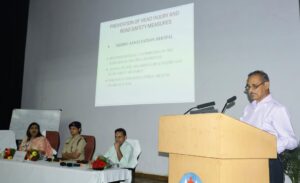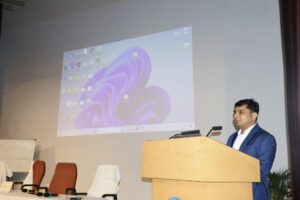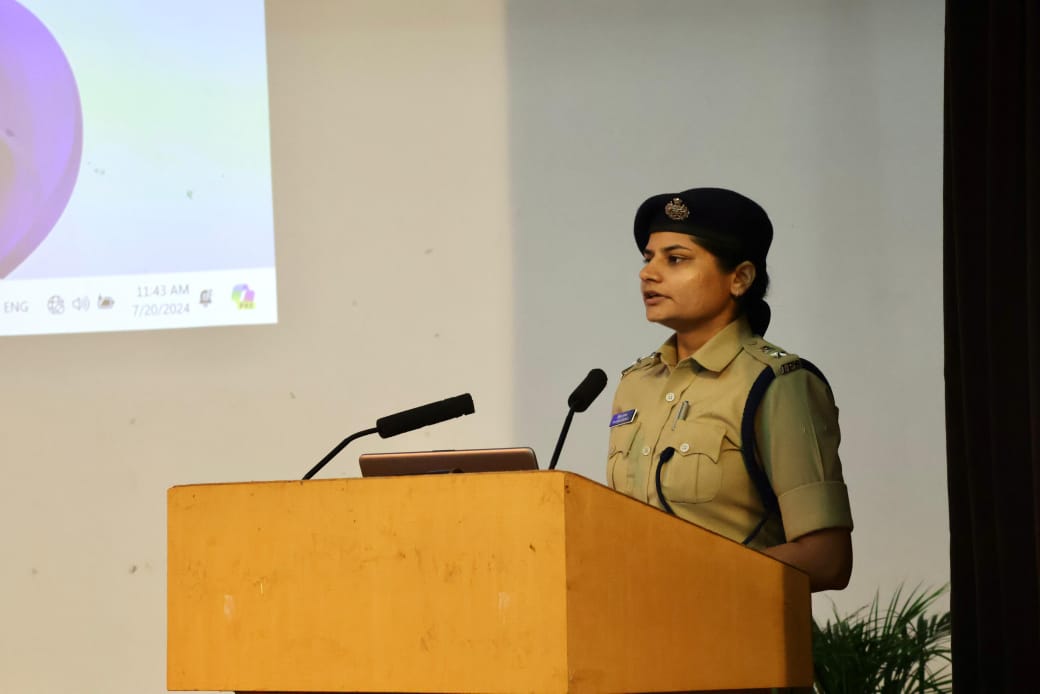CNN Central News & Network–ITDC India Epress/ITDC News Bhopal: If a driver wears a helmet during a road accident, the likelihood of suffering a serious head injury decreases by up to 88%, and the risk of facial injury reduces by up to 65%. Similarly, wearing a seat belt in a car can reduce the risk of severe injury by up to 75%. This information was shared by senior neurosurgeons from various government and private hospitals and colleges in the city during a seminar organized by the Department of Neurosurgery at Bhopal Memorial Hospital and Research Centre (BMHRC). The seminar aimed to raise awareness about road safety and the severe impacts of head injuries resulting from road accidents. The chief guest of the program was DCP (Zone 1) Priyanka Shukla. Other attendees included BMHRC’s Acting Director Dr. Manisha Srivastava, Head of the Neurosurgery Department Dr. Sandeep Sorte, Associate Professor Dr. Saurabh Dixit, and other senior doctors.

DCP (Zone 1) Priyanka Shukla emphasized that the administration is committed to preventing road accidents and is making serious efforts in this regard. District-level road safety meetings are held monthly, attended by the Collector, SP, and top officials from various departments. The police also organize various programs to encourage people to follow traffic rules. She stressed the necessity for two-wheeler riders to wear helmets to prevent road accidents. Popular city spots must enforce the rule of wearing helmets. In Jabalpur, the police have already implemented such a rule.

Dr. Ashok Nayak, President of the Bhopal Neuro Association and a senior neurosurgeon, highlighted that while India has only 1% of the world’s vehicles, it accounts for 6% of road accidents. He stated that the responsibility of preventing road accidents lies with both the government and vehicle drivers, and enforcing traffic rules is essential. Senior neurosurgeon Dr. Nitin Garg pointed out that most road accident victims are men aged 15-40 years. Their accidents have a profound impact on their families, often leading to significant financial strain due to medical expenses. Associate Professor Dr. Rajneesh Gaur from the Neurosurgery Department at Gandhi Medical College mentioned that head injuries from accidents might save lives but often leave victims with lasting impairments, such as difficulties in speaking, hearing, thinking, or sleeping. Some might need lifelong physiotherapy or other therapies. Neurosurgeon Dr. Sandesh Khandelwal stressed the need to raise public awareness about road safety through newspapers, social media, radio, etc. He urged neurosurgeons to educate students in schools and colleges about road safety.
BMHRC’s Acting Director Dr. Manisha Srivastava congratulated the Neurosurgery Department, particularly Dr. Sandeep Sorte and Associate Professor Dr. Saurabh Dixit, for organizing the important seminar. She noted that BMHRC will complete 25 years of its establishment next year, and to make this year memorable, they have committed to conducting 365 activities throughout the year. This seminar on road safety awareness is a commendable part of these activities, with more such programs planned for the future.







